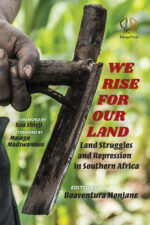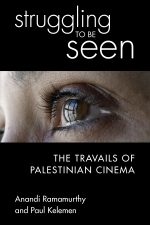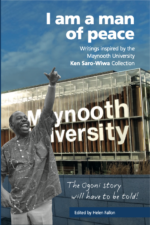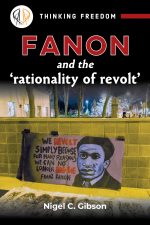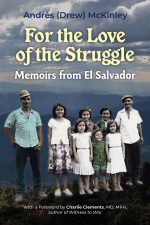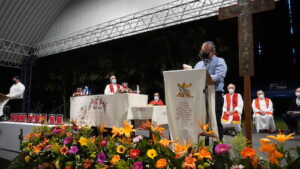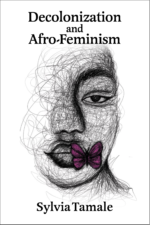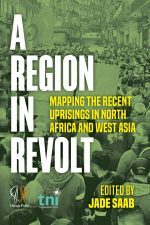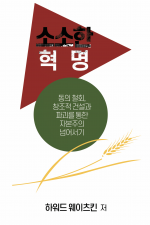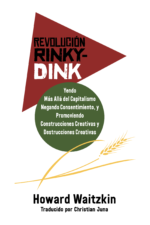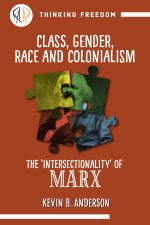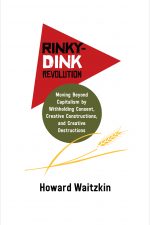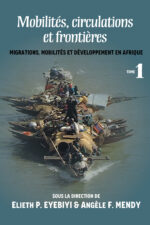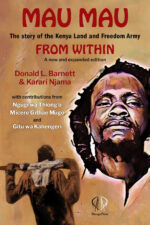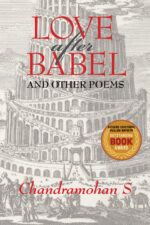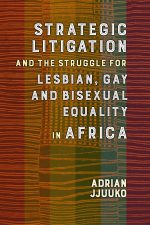-
Lenin150 (Samizdat): 2nd expanded edition
For all the official historiographic efforts at forging a mythologised image of Vladimir Ilyich Ulyanov as the austere, no-nonsense, professional revolutionary, the really existing flesh and blood Lenin understood and appreciated that the most materialist action an individual must carry out without fault to metabolise the struggle for communism is to breathe. Not just biologically respire but consciously breathe. Breathe for oneself and breathe for and with others. If it is indeed our desire to breathe new life into the long choking red star, a new oxygenic Communist politics of walking and breathing is what we must aspire to, inspire, respire and encourage.
See the Description below for further details.
-
Struggling to be seen: The travails of Palestinian cinema
The book explores the challenges Palestinian filmmakers confront to develop a cinema that gives expression to the national narrative. It is based on collaborative research involving Film Lab Palestine, Sheffield Palestine Cultural Exchange and Sheffield Hallam University. We explore the political, economic and cultural contexts that impact on Palestinian film production and some of the barriers encountered in profiling and screening Palestinian films, to shed light on the complex terrain that is traversed to sustain and develop a film industry and film culture in historic Palestine and beyond.
Table of contents
Image credits
Introduction
The struggle to develop a national cinema
The experience of Filmlab Palestine
Visualising the Palestinian past
Roadblocks, borders and hostile environments
The screening and reception of Palestinian films
The Palestinian short film
Conclusion
Filmography
Appendix 1: Cinema of the Palestinian Revolution
Appendix 2: 70 Years of Nakba: Audience response
Appendix 3: Love and Desire in Palestine: Audience response
Appendix 4: Selection of leaflets from film screenings
About the authorsPraise for Struggling to be seen
To so nimbly and elegantly traverse Palestinian time and space is itself a defiance of the occupation’s brutally enforced barriers. The authors’ unstintingly political examination of Palestinian cinema has much to offer both those in the know and readers new to this extraordinary body of work. — Kay Dickinson, Professor, Film Studies, Concordia University
Working extensively through primary sources, conducting research and interviews across generations of Palestinian filmmakers, the authors offer the reader an ambitious and wide-ranging essay which charts the development of a national Palestinian cinema, from an historical and critical perspective. By exploring the constellation of political, social and aesthetic concerns that shape this cinema, this authors challenge us to rethink the stakes behind the contemporary development of a Palestinian cinema industry, its audience reception, in historic Palestine and beyond.— Samia Labidi, cultural programmer & artistic curator
Illuminating and compelling, Struggling to be Seen lays bare the historical, enduring but also emerging (colonial and neocolonial) obstacles to the development of a film industry and film culture within the West Bank and Gaza. Though familiarly sobering (in its re-confirmation of the scale of injustice facing Palestinians), the book provides up-to-the-moment and an interdisciplinary account that provides rich, fresh terrain that reveals new and exciting progressions within Palestinian film culture. —Michele Aaron, Reader in Film and Television, University of Warwick, author of Death and the Moving Image: Ideology, Iconography and I (Edinburgh Univer- sity Press, 2014) Director, Screening Rights Film Festival.
Struggling to be Seen is a must read for those who are interested in under- standing the multilayered challenges that face Palestinian cinematography from its production phase to its screening phase. The book is a short read which takes the readers through the different stages which shaped the Palestinian film making enterprise. Struggling to be Seen shows the restrictions that Palestinian filmmakers face from the initial stages to funding and screening. The authors tell a story of a people whose sense of self-reflection is suppressed by the Israeli oppressive machine which con- stantly works at erasing the Palestinian peoplehood, detaching it from its past.— Nahed Habiballah, Assistant Professor and member of the Board of Directors of Policy and Conflict Resolution Studies Center, Arab American University, Ramallah, Palestine
-
I am a man of peace: Writings inspired by the Maynooth University Ken Saro-Wiwa Collection
This book marks the 25th anniversary of the execution of Nigerian activist and written Ken Saro-Wiwa. The 21 essays, by international contributors, and 42 poems by new and established poets, are inspired by his ideals and activism.
The volume includes contributions by people intimately connected with Saro-Wiwa. His brother Dr Owens Wiwa recounts how his older brother awakened and nurtured his awareness of the tremendous damage Royal Dutch Shell was doing to their homeland, in collaboration with the then Nigerian military government. His firsthand account of the brutality of the military government and its impact; his unsuccessful efforts to save the life of his brother; his time in hiding and subsequent escape, with his family, from Nigeria and his efforts to retrieve the remains of his brother for burial, makes for very moving reading. Likewise, Noo Saro-Wiwa shares her story of growing up in England with strong links to family in Nigeria, and the trauma of hearing of her father’s execution while at University.
Maynooth University, where the editor works as Deputy Librarian, holds the death row correspondence from Ken Saro-Wiwa to Sister Majella McCarron. McCarron provides two personal essays. One, a reflection on the events that shaped her work with Saro-Wiwa in Nigeria and her subsequent efforts to save the lives of the Ogoni 9: the second essay explores her experience as a table observer of the Shell to Sea campaign, which strove to have gas, discovered off the west coast of Ireland, refined at sea rather than inland.
The damage that Shell has caused in Ogoni and the issue of redress are topics addressed in essays by experts including Mark Dummett, of Amnesty International, who investigated how Shell and other oil companies have caused or contributed to human rights abuses through their operations in the Niger Delta. Daniel Leader, a barrister and partner at Leigh Day’s international law department, the firm who have led a number of ground breaking human rights cases, including a series of cases against Shell on behalf of Nigerian communities, explores the issue of legal redress. Architect, environmental activist, author and poet Nnimmo Bassesy’s wide ranging essay presents Saro-Wiwa as activist and writer and creator of the Ogoni Bill of Rights, against the backdrop of the UNEP report of the Environmental Assessment of Ogoniland, which recorded that drinking water in Ogoni had benzene, a carcinogen, at over 900 times the level permitted
I welcome the publication of this volume which highlights the work of Trócaire and other people and organisations
to fight for a more just world. Trócaire campaigned strongly for the release of the Ogoni 9 and continues to campaign for justice in the face of state and corporate violations of human rights. The writings of Ken Saro-Wiwa and those inspired by his work keep the flame of justice lit.Dr Caoimhe De Barra, Chief Executive Officer, Trócaire.
The publication of I am a Man of Peace: Writings Inspired by the Maynooth University Ken Saro-Wiwa Collection highlights the shift towards peaceful protests as a means to a more sustainable end. It is a justification that one’s dreams for the greater good can still be attained without bloodshed. Ken preached, lived, and practiced peace in his search for justice even in the face of stiff opposition. Years after his death, Ken’s ideologies and philosophies have proved relevant today.
Dr Owens Wiwa, Executive Vice-President, Clinton Health Access Initiative (CHAI).
Sister Majella McCarron’s choice of Maynooth University for this unique donation was particularly appropriate, given the University’s long involvement with issues of inclusion and justice in Ireland and abroad. This deep-rooted commitment is today articulated in our University Strategic Plan, where a strategic goal is ‘to build on our achievements to date and become a model University for equality, diversity, inclusion and inter-culturalism, where social justice, addressing inequality and empowering people are central to our mission.’ This book makes a significant contribution to that goal.
Dr. Gemma Irvine, Vice-President of Equality & Diversity, Maynooth University.
Writing can urge us to pause, to think, and to discover what we really want to say. Sharing that writing calls for courage and support. In this publication, as Jessica Traynor suggests, we see the evidence of a new generation of Irish and new Irish citizens engaging with complex issues through poetry. Reading their poems, we may begin to understand more about each other and ourselves. By bringing together these Irish and new Irish voices the book contributes to building a shared discourse which is essential for trust, community and hope.
Dr Alison Farrell, Founder of the Summer Writing Institute For Teachers (SWIFT) and Co-founder Irish Network for the Enhancement of Writing (INEW)
-
in, against, beyond, corona
The corona crisis reveals what is wrong and toxic — in ourselves, in relation with others, and in relation with the rest of non-human nature. But we can also look for what is good and life-affirming. The authors argue that the future must be founded on ‘kindness, social solidarity and an appropriate scale of time’, a future that cherishes life and the connections that transcend borders. This pamphlet is a vital contribution to much needed reflections and discussion.
This is a fabulous book. Usually a blurb or endorsement like this is supposed to enhance the book, but in this case the flow is in the other direction. For me it is a huge honour to be associated with it. Like many others, I have been trying for months to get my head around what is happening, trying to formulate my ideas, and then here it is, in these pages, so clear, so understanding, so challenging. How we now go on to shape the interconnectedness between people and between people and other forms of life will determine the future of humanity. The best, most sensitive, most realistic, strongest thing that I’ve read on the Corona Crisis. — John Holloway, Professor, Institute for Humanities and Social Sciences, Autonomous University of Puebla, Mexico, and author of In, Against, and Beyond Capitalism:
The San Francisco LecturesThis pamphlet, part of Daraja Press’s Thinking Freedom Series, is written by Mark Butler with his colleagues at the Church Land Programme, a small independent non-profit organisation based in KwaZulu-Natal province, South Africa, that seek to distill learnings that emerge from the work of militants on the ground.
-
Fanon and the rationality of revolt
We inhabit extraordinary times: times in which we are acutely aware of the intensity of what revolutionary thinker Frantz Fanon called “the glare of history’s floodlights.” The velocity and scale at which the revolt against police murder that began in Minnesota after the death of George Floyd on May 25th and moved throughout the US, and then other parts of the world, was astonishing. It was impossible to predict, but then, in retrospect, it is George Floyd’s death becomes a nodal point: calling for action as well as rethinking and self-clarification. Thinking about this moment with the world revolutionary Frantz Fanon, we need to be aware of continuities and discontinuities — or, as he puts it, opacities — between the ages, his and ours. Fanon is always speaking to us, but often in ways we cannot hear. We have to work to listen to him and to understand the new contexts and meanings in relative opacity. It is this constant dialogue that helps illuminate the present and enable ongoing fidelity to Fanon’s call in the conclusion of The Wretched of the Earth the necessity to work out new concepts to confront one of Fanon’s greatest concerns, the betrayal of the revolutionary movement. In this pamphlet we consider how Fanon’s idea of liberation is connected with “the rationality of revolt.” The practice of engaging Fanon not only with revolt but with the reason or rationality of revolt connects with Fanon’s idea of how this liberated humanity is a product of a new consciousness of collectivity open to rethink everything.
-
소소한 혁명
Suggested Price: USD $ 4.99어떻게 자본주의를 넘어설 것인가라는 질문에 대한 답을, 지금 우리가 “감히” 찾아보려고 한다. 이 소책자를 통해, 자본주의를 벗어나 생태사회주의로 향하는 길을 찾는 우리의 노력이 뚜렷해지길 바란다.
자본주의에 갇힌 우리는, 어떤 형태로든 행동 또는 비행동inaction에 관여하고 있다. 행동은, 자본주의를 직접 마주하기 보다는 자본주의가 초래하는 심각한 여러 문제를 개선하기 위한 투쟁에 참여하는 모습을 띈다. 즉, 우리의 행동은 원인이 아니라 결과에 초점을 맞추는 모순을 보인다.
반면, 비행동은 동의를 의미하게 된다. 우리는 자본주의 경제 체계를 영속시키는 경제 활동에 문제 제기를 하거나 변화를 요구하는 행동을 하지 않음으로써 자본주의에 [암묵적으로] 동의하고 있다. 결과적으로 평범한 우리가 자본주의에 봉사하는 자본가 역할을 계속하고 있는 것이다.
왜 자본주의 억압의 대상인 우리가 억압에 동의하는가? 그 이유가 단지 [외부의] 탄압 때문만은 아니라고, 이탈리아 파시즘 하의 감옥에서 그람시Antonio Gramci는 말했다. 즉, “헤게모니”를 장악하는 이념이 우리의 삶을 둘러싼 억압적인 환경을 설명하고 정당화하는 것이다.
“소소한 혁명”은, 개개인의 삶 속에서, 쉽고 안전하게, 엄청 근사하지는 않지만 일상적이고 실천가능한 행동과 비행동을 얘기한다. 지금까지의 혁명사는, 혁명을 가능하게 했던 전체 민중보다는 소수의 혁명가에 주목했었지만, 자본주의에 맞서는 “우리는” 마르크스나 엥겔스가 떠올렸던 주인공들보다 훨씬 다양하고 규모가 커졌다. 자본주의를 수호하기 위해 싸우는 “그들은” 전 세계 인구의 극소수일 뿐이다.
자본주의의 어떤 특징이 억압적이고 그래서 제거되어야 하는지, 또 반대로 어떤 사회경제구조의 특징이 억압적이지 않으며 그래서 남겨져야 하는지를 뚜렷이 설명하는 전략이 필요하다. 자본주의 이후 사회가 어떤 모습이어야 할지는 점점 명확해지고 있다. 소소한 혁명은, 자본주의의 영속과 발전에 필수적인 과정에 대한 우리의 동의를 거두는 데에서 시작하여, 수 백 만의 우리가, 여전히 적은 소수이긴 하지만, 건설적인 혹은 파괴적인 노력에 창의적으로 참여할 수 있는 방법 또한 포함한다.
세상은 자본주의 그 이후로 이미 진행 중이다. 세계 곳곳에서 창의적인 모습의 공동체communal organization들이 생겨나 스스로 통치하고 구성원들의 생존과 안녕을 보장하기 위해 활동하고 있다. 복지 국가를 포함한 자본주의 국가를 넘어서는 것은 국가 자체를 넘어서는 결과로 이어진다. 연대 경제solidarity economy는 먼저, 소규모의 협동조합 성격을 띄는, 저렴하고 유쾌하고 편안한 주거 공간을 구성하는 방법을 모색하여, 착취적인 임대료, 빚, 세금, 보험에 대한 공동의 해결책을 제시한다. 또한 이러한 공동체는, 영양이 풍부한 먹거리를 지역에서 생산하여 유통하는 방법으로, 자본주의식 농업으로부터 독립을 꾀할 수 있다.
창조적 파괴는, 허가를 받아 하는 대규모의 시위가 아니라 자본주의가 순조롭게 기능할 수 없게 멈추거나 둔화시키는 직접 행동으로 가능하게 된다. 우리가 투자나 세금으로 흘러가게 내버려 두는 돈의 흐름을 비자본주의적인 연대경제에 돌리는 것도 창조적 파괴의 한 방법이다.
소소한 혁명은, 간단하고 안전하며, 자신의 삶을 조금이라도 바꾸고 싶은 의지가 있는 사람이라면 실천가능하다. 자본주의가 우리의 안녕과 행복을 파괴하는 체계라는 것을 알면서도, 부지불식간에 자본주의를 지지하고 동의하는 행동을 멈추는 즐거움을 누릴 수 있다. 놀랍게도 혁명을 위해 다치거나 죽지 않아도 되고, 심지어 큰 불편을 감수하지 않아도 된다. 우리가 해야 할 일은 단 하나. 어차피 하기 싫었던 여러 일들을 이제 정말 그만두는 것이다.
-
Revolución Rinky-Dink: Yendo Más Allá del Capitalismo Negando Consentimiento, y Promoviendo Construcciones Creativas y Destrucciones Creativas
Suggested Price: USD $ 4.99Este panfleto aborda la pregunta: ¿cómo podemos pasar de A a B, del capitalismo al poscapitalismo? La revolución de Rinky-dink involucra acciones e inacciones que son fáciles, seguras, mundanas, sin glamour y factibles dentro de la vida de cada persona.
Howard Waitzkin presenta una intervención clara y directa para el cambio revolucionario en el sistema económico capitalista global. Cubre mucho terreno, con sofisticación, mientras mantiene la discusión en tierra. Su enfoque en las formas de facilitar un desafío al capital y construir una mayor transformación revolucionaria es crucial en esta coyuntura histórica. Esta discusión sobre construcciones creativas y destrucciones creativas es particularmente útil.
— Brett Clark, profesor de sociología de la Universidad de Utah y autor De El Robo De La Naturaleza: Capitalismo Y Grieta Ecológica, The Robbery of Nature: Capitalism and Ecological Rift en inglés.
El fin del capitalismo es posible. Waitzkin nos lleva un paso más allá en el proceso creativo para esta transformación. A través de ejemplos específicos de grupos organizados dentro de los Estados Unidos y en el extranjero, este trabajo constituye una guía práctica para todos. Waitzkin alienta nuestra creatividad para actos organizados y seguros además de omisiones para trascender el capitalismo.
— Nylca J. Munoz Sosa, abogada, líder de salud pública y activista centrada en la justicia sanitaria y la descolonización en Puerto Rico.
-
Mau Mau From Within: The Story of the Kenya Land and Freedom Army
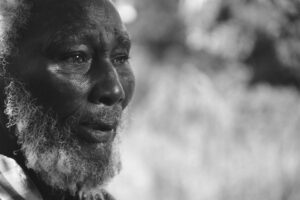
Karari Njama: Photo by Geoffrey Mwangi curated by Kairu Kuguru. The inside story of the struggles of the Kenya Land and Freedom Army, referred to by British colonialism as the ‘Mau Mau rebellion’, is little known today. The autobiographical material written by Karari Njama (a senior leader in the Mau Mau hierarchy) and compiled by Donald L. Barnett was first published by Monthly Review Press in 1966, as Mau Mau From Within: An analysis of Kenya’s Peasant Revolt. It was reprinted in 1970; it has remained out of print for many years. As the late Basil Davidson put it in his review of the first edition: “Njama writes of the forest leaders’ efforts to overcome dissension, to evolve effective tactics, to keep discipline, mete out justice … and to teach men how to survive in those merciless forests. His narrative is crowded with excitement. Those who know much of Africa and those who know little will alike find it compulsive reading. Some 10,000 Africans died fighting in those years . Here, in the harsh detail of everyday experience, are the reasons why.”
The book is an extraordinary story of courage, passion, heroism, combined with recounting of colonial terror, brutality and betrayal. It is a story of how the very idea of being ‘Kenyan’ was intimately linked to the idea of freedom, a connection that was destroyed not only by the firepower of the British, but also by those who collaborated and established themselves as the beneficiaries of neocolonial rule. Disconnecting notions of freedom from identity left only a caricature that rapidly descended into tribalism and ethnicity.
This momentous story of the struggle for freedom described here is relevant not only for a new generation of Kenyans but also for all those engaged in emancipatory struggles internationally. For so long as the experiences arising from the struggles described in this book are perceived as merely ‘African’ or ‘Kenyan’, it is not possible to fully grasp the contributions they have made to the struggle for a universalist humanity.
What is recounted in this publication is more than an ‘analysis of a peasant revolt’. It is above all a history of the Kenya Land and Freedom Army. As Ngūgī wa Thiong’o points out in his Preface to this new edition, ‘we don’t have to use the vocabulary of the colonial to describe our struggles.’ We were tempted to rename the book ‘Kenya Land and Freedom Army from Within.’ But because the original title has wide recognition, and and as one of the characteristics of movements of the oppressed is to appropriate derogatory terms used by their oppressors and repurpose them as an expression of pride in their own experiences, this book retains the original title, but with a change in the subtitle as ‘The Story of the Kenya Land and Freedom Army.’
We were delighted that Karari Njama was able to provide us with a Prologue to the new edition (Kamoji Wachiira, a former political prisoner, connected us with Karari and translated the text of the Prologue). Shujaa Hon Dr Gitu wa Kahengeri, Secretary-General of the Mau Mau War Veterans Association reminds us how the veterans of the liberation movement, like Karari Njama, continue to live in extreme poverty today despite the enormous contribution that they made to the struggle for freedom.
Kenya’s leading writer and academic, Ngūgī wa Thiong’o, points out in the Preface, how so much of the narratives about the Kenya Land and Freedom Army has been written from ‘without’, emphasizing the importance of a book that speaks to the personal testimony from within the movement. We are honoured to have Mīcere Gīthae Mugo, Emerita Professor of Literature at Syracuse University, provide reflections on the importance of the republication of this historical text. There are many who, as children, lived through the terrifying events of the Emergency during which so many were tortured and killed by the British (and their local collaborators) and whose psyche remains deeply affected by what they witnessed. Kamoji Wachiira describes some of these experiences vividly in his Introduction to the new edition. He highlights the extent of betrayal by successive post-independence governments, and the development of the post-independence revival of resistance which he was a central part of. He also emphasizes the importance for a new generation of Kenyans “to gain not only a deep understanding of Kenya’s revolutionary history but also to reflect on what lessons may be drawn for the struggle to achieve real freedom.”
The original publication had no biographical information about Don Barnett. Few are aware of the extent of Don’s political engagement with the cause of liberation, of which Mau Mau From Within was only one aspect. He was a founder of the Liberation Support Movement in Canada, and had close contact with the MPLA (Popular Movement for the Liberation of Angola). Don sadly joined the ancestors in 1975. We are fortunate, however, that Don and Daphne’s son and daughter, Michael Barnett and Dawn Barnett, were able to provide, together with Ole Gjerstad, a revealing biography.
We have endeavoured to retain the content of the original book (but for a few minor corrections) including the original Selected Bibliography. An updated Further Reading list is provided.
-
Love after Babel and other poems
ANNOUNCEMENT: Love After Babel wins Nicolás Cristóbal Guillén Batista Outstanding Book Award by the Caribbean Philosophical Association
Congratulations to Chandramohan S!
Love after Babel is a collection of poems that deal with themes such as caste, the resistance of Dalit people, Dalit literature, islamophobia and other political themes, with almost one hundred poems divided into three sections (Call Me Ishmail Tonight; Name Me a Word; Love after Babel). The introduction is by Suraj Yengde (award-winning scholar and activist from India, author of the bestseller Caste Matters, inaugural postdoctoral fellow at the Initiative for Institutional Anti-racism and Accountability, Shorenstein Center on Media, Politics and Public Policy at the Harvard Kennedy School).
Chandramohan’s poems are dialogues of the ‘ self’ with the ‘other’. He brings to life a world that subverts myths, literary canons, gender and caste stereotypes by pooling in sparklingly new metaphors with sensitivity and care. He draws his images from contemporary incidents as well as myths and legends of yore, and delves deep into the politicized realm, thus ‘rupturing the hymen of demarcations’ of identity, resistance, repression and love.
—Babitha Marina Justin, poet, artist and academician
Chandramohan’s poetry is an extraordinary combination of a strong individual voice, crying out against a deeply felt sense of personal abuse, and a sophisticated understanding of the long history and mythology of such abuse, in India but also in the world at large. Mythological figures like Shambuka and Urmila illluminate, and are illuminated by, modern atrocities. The poems are by turns shocking, moving, and exhilarating. —Wendy Doniger O’Flaherty is an American Indologist whose professional career has spanned five decades.
Chandramohan S has the stark ability as a poet to react to any social happening, and these turn out to be in the most responses to societal happenings, plunged into the dark interiors of human behavior. So these could be related to caste oppression. Economic exploitation, religious polemics etc. But the poetic ability or the agility is always there to handle a situation born out of politico- social situations. There lies his remarkable dexterity as a poet commentator. His lines are direct, and even angry. But that does not matter. This is poetry- at its best. No wonder then that, his poems have been published world wide. He is perhaps now one of the very few, if not the only Indian poet in English to have taken the burden of social and political repression, as a distinct and livid political idiom. To read his poems is also painful, but the poetry is in the pain!—Ananya S Guha lives in Shillong in North East India. He has been writing and publishing his poetry for the last 33 years.
Love after Babel selected by as one of Twelve books that form part of the arsenal of Dalit writing by Suraj Yangde. surajyengde@surajyengde
surajyengde@surajyengdeHad an honor to introduce this extremely riveting collection of humanity-filled radical lines “Love After Babel” told by the incomparable art form—Dalit Poetry. Chandramohan is confidently flirtatious with his words. by
-
Strategic litigation and the struggle for Lesbian, Gay and Bisexual equality in Africa
There has been a rise in the use of strategic litigation related to seeking equality for lesbian, gay, and bisexual (LGB) persons. Such developments are taking place against the backdrop of active homophobia in Africa. The law and the general public should, argues the author, treat LGB persons in the same way that heterosexuals are treated. In the past two decades,30 strategic cases have been fi led by LGB activists in the Common Law African countries, namely in Botswana, Kenya, Nigeria, South Africa, and Uganda. While the majority of the cases have been successful, they have not resulted in significant social change in any of the countries. On the contrary, there have been active backlashes, counter-mobilisations, and violence against LGB persons, as well as the further criminalisation of same-sex relations and constitutional prohibitions on same-sex marriages in some of the jurisdictions. The author argues that activists in Common Law Africa have to design LGB strategic litigation in such a way as to fi t within the actual social and political conditions in their countries if strategic litigation is to spur social change.
Adrian Jjuuko is an exceptional scholar. A rare combination of intellectual brilliance, commitment and hard work. The book is born of this. It reflects his incisive analytical skills, anchored in solid knowledge of the law and jurisprudential developments in the field. His ventures into political theory, philosophy, and the social sciences give the analysis additional clarity and empirical grounding.
—Siri Gloppen, Norwegian political scientist, professor of Comparative Politics at the University of Bergen and Director of the CMI-UiB Center on Law and Social Transformation.
Adrian Jjuuko’s meticulously researched examination of the use of strategic litigation not only celebrates the many victories which have been realized in a range of African courts of law, it also reviews and critiques the losses. He demonstrates that the law can be both an effective tool for liberation, just as it can consolidate minority oppression, gender injustice and sexual tyranny. This book is a deeply engaging and highly recommended text for those interested in shaping the evolving rights and struggles of sexual minorities on the continent for decades to come.
— J. Oloka-Onyango, Professor of Law Makerere University School of Law
-
Wreaths for a Wayfarer: An Anthology in Honour of Pius Adesanmi
Pius Adesanmi died in the doomed Ethiopian Airline flight 302 on March 10, 2019. Wreaths for a Wayfarer: An Anthology in Honour of Pius Adesanmi is an assemblage of 267 original poems written by 127 established and emerging African writers. While some of the poets celebrate Adesanmi, others reflect philosophically on existence, mortality, immortality and/or offer hope for the living. In this memorably textured collection, the poets – some who knew, and some who did not know Adesanmi – exorcise the pains of loss through provocative poems that pour out their beating hearts with passion.
Chris Dunton, editor of Wasafiri, writes:
“… Adesanmi’s passing has been commemorated in a superb anthology of commissioned poems, Wreaths for a Wayfarer. This beautifully produced volume contains the work of 126 contributors, mainly from Nigeria, but also from other countries, ranging from Mexico, through the UK, to Sri Lanka; as Odia Ofeimun puts it in his foreword: ‘Pius Adesanmi was ‘my personal person’, as he was to so many people around the globe’ (xxv). It also includes a selection of poems from Adesanmi’s own collection The Wayfarer.
“Nduka Otiono’s Introduction to the anthology is a model of its kind, eloquent, heartfelt and informative, with a great deal of valuable background material in footnotes. An especially pleasing touch, so much in the spirit of Adesanmi the dedicated mentor, is the editors’ decision to take on ‘budding poets . . . [a decision which] necessitated editing and working with such authors to help develop writings that might otherwise have been rejected’ (7). A little later, Nduka comments: ‘we conceptualized an anthology that will be enduring in its thematic range and stylistic variety. And we got one’ (8). …”
Table of Contents
Acknowledgements |Foreword—Odia Ofeimun | Introduction: Death and an African Digital Towncrier—Nduka Otiono | Introit: Coffin in the sky—Niyi Osundare
Part I. WAYFARER
Scabha or The Sliding Door Operator—Sihle Ntuli | When an Iroko Falls—Iquo Diana Abasi | How to Survive War in Nigeria—Iquo Diana Abasi | I Wet the Earth, I Sing You Wreaths… —Fareed Agyakwah | Harvest IV—Funmi Aluko | Wayfarer—Funmi Aluko | The Wayfarer—Saudat Salawudeen | End of Forever—Saudat Salawudeen | Muse of Homecoming—Justus K. S. Makokha | Encore— Agatha Agema | Now that I know young birds die in flight—Segun Michael Olabode | The Water-Pot is Broke—Susan Bukky Badeji | from absence, memory and farther—Obemata | Umbilicals—Tijah Bolton-Akpan | The Pilgrim Unbound—Clara Ijeoma Osuji | Eclipsed at Noon—Abdulaziz Abdulaziz | To the Daughters— Abdulaziz Abdulaziz | The Traveler—Abiodun Bello | For the Wayfarer—Chifwanti Zulu | The Acts of Brother—’Bunmi Ogungbe | Backing His Daughter: For Pius, on Facebook—Jane Bryce | Avoiding Sunlight—Unoma Azuah | Akáṣọléri ́ (Mourners) —Kọ́lá Túbọ̀sún | Last Tweets—Kọ́lá Túbọ̀sún | Farewell, Wayfarer—Oyinkansade Fabikun | Solitaire—Kafilat Oloyede | How to Keep the Wake for a Shooting Star—Chuma Nwokolo | Eagle—Uzo Odonwodo | In Memoriam—Uzo Odonwodo | Can You Do This Thing?—Sarah Katz-Lavigne | Lights—John Chizoba Vincent | The Meteorite—Omowumi Olabode Steven Ekundayo | Black Box—Ian Keteku | Paramour of the Pen—Abraham Tor | Flying Coffin—James Onyebụchi Nnaji | Looking for the Dead—James Onyebụchi Nnaji | The Eagle Perched—Moses Ogunleye | A Pius Flight—Kennedy Emetulu | Kwanza for Pius—Ifesinachi Nwadike | Dream-mare—Nidhal Chami | A Walk in the Graveyard—Chimeziri C. Ogbedeto | Payo—Biko Agozino | Iku—Peter Olamakinde Olapegba | He left—Amatoritsero Ede | Spousal Loss—Peter Olamakinde Olapegba | The Face of My Savior is the Ordinary Moment—Gloria Nwizu | Denouement—Gloria Nwizu | A Conversation between Two Young Cousins—Ethel Ngozi Okeke | Sunday Flight—Emman Usman Shehu | Departure—Ivor Agyeman-Duah | The Count—Uthpala Dishani Senaratne | Rude Shock—Olajide Salawu | Saturday 12:56—Ludwidzi M. K. Mainza | Daughter—Ludwidzi M. K. Mainza | Tough Love—Nnorom Azuonye | In the Midst of it All, I am…—Anushya Ramakrishna | Haiku – Ai-Ku (Immortality) —Adesanya Adewale Adeshina | He Rose—Adesanya Adewale Adeshina | A Singing Bird—Adesanya Adewale Adeshina | Arrivant—Akua Lezli Hope | EarthWork Sestina—Akua Lezli Hope | Animalia, Chordata, Mammalia, Proboscidea—Akua Lezli Hope | Poem of Relief: When Your Sadness is Alive—Kennedy Hussein Aliu | If I Seek—Kennedy Hussein Aliu | When You Ask me About my Teacher—Kennedy Hussein Aliu and Leyda Jocelyn Estrada Arellano | The Eagle is not the Quills and Talons—Olumide Olaniyan | without a farewell—Nduka Otiono | After the Funeral—Nduka Otiono | Fugitives from the Violence of Truth—Efe Paul-Azino | Just but a Journey—Sam Dennis Otieno
Part II. REQUIEMS
Elegy for Pius—Helon Habila | This Exodus Has Birthed a Song—Echezonachukwu Nduka | where to find you: a requiem—Echezonachukwu Nduka | Blown—Richard Inya | words melt in his mouth—Peter Midgley | Requiem for the Fallen / Mogaka o ole—Lebogang Disele | To Our Hero: Rest in Peace—Lebogang Disele | What Shall We Do to Death?—Winlade Israel | A Star Just Fell—Winlade Israel | Requiem—Peter Akinlabi | Requiem for Pius—Rasaq Malik Gbolahan | Wayfarer—Rasaq Malik Gbolahan | Twirling the Beads of Grief… —Tade Aina | Say me Rebellion—Kingsley L. Madueke | When this Calabash Breaks—Kingsley L. Madueke | Requiem for the Wayfarer—Adesina Ajala | Song of Sorrow—Soji Cole | Planting Season—Anote Ajeluorou | For Our Departed Bard—Maria Ajima | Memory of Tear—Joshua Agbo | Why? —Margaret Wairimu Waweru | Letter to Dad—Margaret Wairimu Waweru | Missing Voices—Ugochukwu P. Nwafor | Tears on Canvas—Wesley Macheso | Nausea—Wesley Macheso | This Easter—Wesley Macheso | When I Am Gone—Maryam Ali Ali | Nothing Has Changed—Maryam Ali Ali | Protest—Ejiofor Ugwu | Our Voice is Gone—Janet James Ibukun | Agadaga Iroko / Giant Iroko—Sunny Iyke U. Okeigwe | This Poetry—James Tar Tsaaior | The Passing of Pius—Uzor Maxim Uzoatu | Light Dims to Shine Forever—Akachi Adimora-Ezeigbo | You Bled Africa! —Mitterand Okorie | To the Muse of Isanlu: A Salute—’BioDun J. Ogundayo | you remain with us—Nkateko Masinga | A Bit of Narcissism—Okwudili Nebeolisa | Bereavement—Okwudili Nebeolisa | Dirge for the Departed—Koye-Ladele Mofehintoluwa | If Only—Femi Abidogun | Falling Birds—Yusuff Abdulbasit | Immortality—Yusuff Abdulbasit | Harvest of Deaths—Yemi Atanda | The Horse and the Tortoise—Yemi Atanda | The Chorus Is Death—Ubaka Ogbogu | Breaking Bread—Obiwu | Still They Hunt for Emmett Till—Obiwu | on wisdom’s wings—Jumoke Verissimo
Part III. HOMECOMING
The Indent (For Pius) —Uche Nduka | when the sun sets—Adejumo Uthman Ajibola | Aridunun Akowe—Dahunsi Ayobami | Pius: Myth, Mystic, Mystery—Tenibegi Karounwi | Returning the Light as Wreath—Ndubuisi Martins (Aniemeka) | Naija is a Badly-Behaved Poem—Ndubuisi Martins (Aniemeka) | Confessions of a Gypsy—Richard Kayode O. James | When the Pious Die—Uchenna-Franklin Ekweremadu | Song of the Pilgrim—Obinna Chukwudi Ibezim | Pius, the Seed—Celina O. Aju-Ameh | Cloud Coffin—Tola Ijalusi | Letter to My Father—Ololade Akinlabi Ige | I Journey Quietly Home—Martin Ijir | Hopeful People—Ndaba Siban | Explaining My Depression to You—Yusuf Taslemat Taiwo | The Broken Quill—Nathanael Tanko Noah | we do not know how to carry this pain—Edaki Timothy. O | Stars, Out—S. Su’eddie Vershima Agema | Converging Skies and Shadows—S. Su’eddie Vershima Agema | Will You? —Biodun Bamgboye | Farewell—Maryam Gatawa | Transit to Kenya—Anthony Enyone Ohiemi | Abiku Agba—Usman Oladipo Akanbi | Evening Bird—Bayowa Ayomide Micheal | Withered Green—Augustine Ogechukwu Nwulia | Home Call…047—Onuchi Mark Onoruoiza | Outshining the Stars—Onuchi Mark Onoruoiza | The Eagle Has Fallen—Manasseh Gowk | Farewell—Manasseh Gowk | Death—Khalid Imam | The Flood—Khalid Imam | Blue Skies—Yejide Kilanko | This Very Goodbye—Nseabasi S. J. King | The Deserted Road or Elegy for Pius Adesanmi—Daniel Olaoluwa Whyte | What My Father Said on His Death Bed—Gbenga Adesina | Wayfarer—James Yeku | One Meets Two—James Yeku | First Goodbye—D.M. Aderibigbe | Monster—Afam Akeh | where you are now—Raphael d’Abdon | When the Curtains Fall—Uchechukwu Umezurike
PART IV. A SELECTION FROM PIUS ADESANMI’S THE WAYFARER AND OTHER POEMS
The Wayfarer—Pius Adesanmi | Ah, Prometheus! —Pius Adesanmi | Odia Ofeimun: The Brooms Take Flight—Pius Adesanmi | To the Unfathomable One—Pius Adesanmi | Message from Aso Rock to a Poet in Exile—Pius Adesanmi | Entries—Pius Adesanmi
Part V. POSTLUDE
A Prose-Poem, a Tribute, and a Wreath for Pius—Adesanmi Anu’a-Gheyle Solomon Azoh-Mbi | When and If…—Pamela J. Olúbùnmi Smith
Contributors
About the editors
Reviews: Otiono, Umezurike announce release of Wreaths for a Wayfarer
Soundtrack to a Wayfarer s Transition by Eyitayo Aloh https://doi-org.proxy.library.carleton.ca/10.1080/00083968.2020.1829830
“Wreaths for a Wayfarer is an eclectic collection of 161 poems by 126 poets and writers, woven like a tapestry of words into a wreath for one of their own. The mix of writers cuts across generations, social strata and stylistic practices of the genre. Rather than being a drawback, this is actually a strength of the anthology, that one man can bring together such an array of writers in one tome. It is an attestation to the influence of Adesanmi, the wayfarer, on his earthly journey – a man who served as a bridge that connected people from different backgrounds and brought them together for a common cause, be that the academic field of African studies and his desire to see it gain greater traction in academia, or global literature at large and his love of deconstructing the western canonisation of literature. Above all these, however, Adesanmi quintessentially remained a human with love for fellow humans. lt is a testament to Adesanmi’s influence and reach across generations that renowned African poets such as Niyi Osundare, Helon Habila, Akachi Adimora-Ezeigbo, Maxim Uzor Uzoatu, Emman Usman Shehu, Jumoke Verissimo and Funmi Aluko, all representing various ethnic and generational divides, share the pages of the collection with up and coming poets in a poetic salute to a wayfarer who also happens to belong to their artistic tribe.
As a collection, Wreath for a Wayfarer fills a gap in the coming to terms with the tragic passage of Pius Adesanmi by his artistic peers. In a culture that has become so material, that the concept of a wreath carries with it the presence of a cadaver and a tomb – neither of which was present at the time Pius died, due to the nature of his death – to have a “wreath” of words helps give Adesanmi’s contemporaries closure and deal with the trauma that accompanied his passing. One of the co-editors, Nduka Otiono, alludes to this in his introduction, pointing out that the poems represent “the collective wreaths laid by a dispersed community of writers unsettled by the untimely loss of Adesanmi.”



